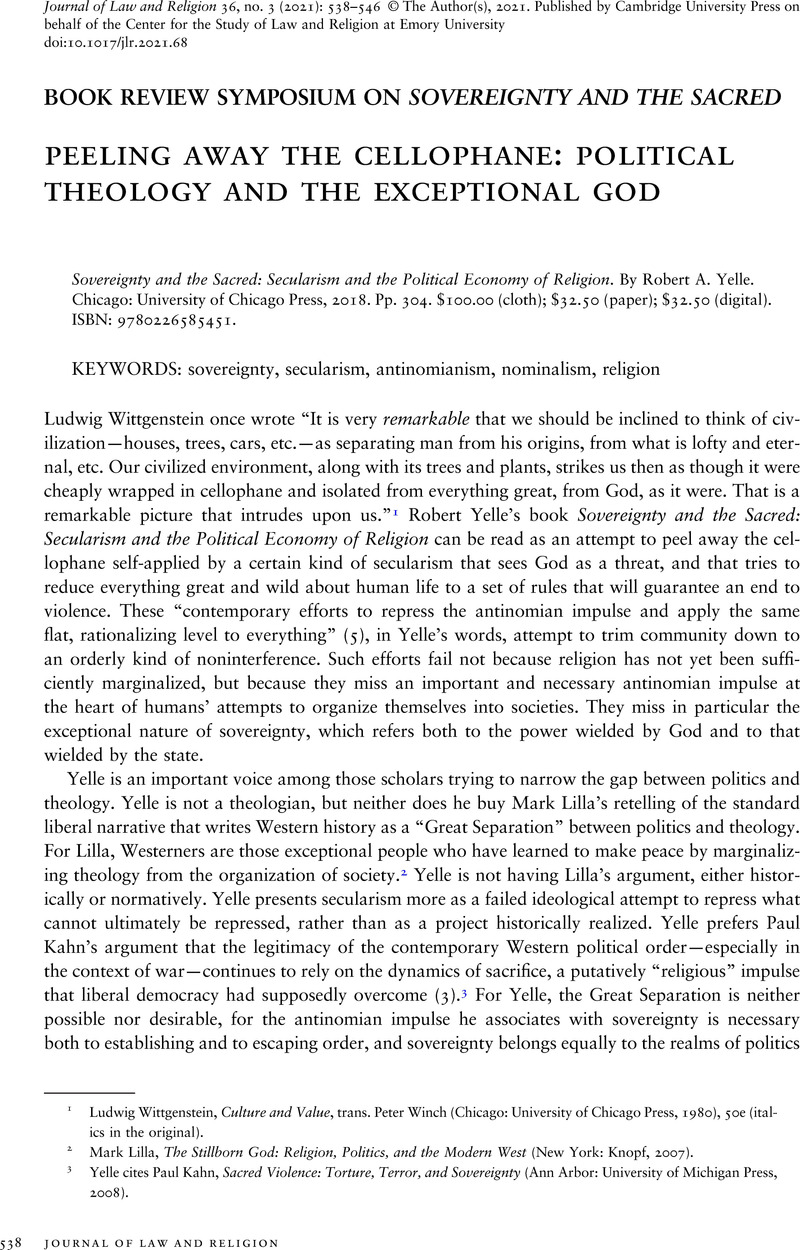No CrossRef data available.
Published online by Cambridge University Press: 16 November 2021

1 Ludwig Wittgenstein, Culture and Value, trans. Peter Winch (Chicago: University of Chicago Press, 1980), 50e (italics in the original).
2 Lilla, Mark, The Stillborn God: Religion, Politics, and the Modern West (New York: Knopf, 2007)Google Scholar.
3 Yelle cites Kahn, Paul, Sacred Violence: Torture, Terror, and Sovereignty (Ann Arbor: University of Michigan Press, 2008)CrossRefGoogle Scholar.
4 “So the ‘code fetishism,’ or nomolatry, of modern liberal society is potentially very damaging. It tends to forget the background which makes sense of any code: the variety of goods which the rules and norms are meant to realize, and it tends to make us insensitive, even blind, to the vertical dimension. It also encourages a ‘one size fits all’ approach: a rule is a rule. One might even say that modern nomolatry dumbs us down, morally and spiritually.” Charles Taylor, A Secular Age (Cambridge, MA: Harvard University Press, 2007), 707.
5 See Carl Schmitt, Political Theology: Four Chapters on the Concept of Sovereignty, trans. George Schwab (Chicago: University of Chicago Press, 2005), 5–35.
6 Pahman, Dylan, “Alive from the Dead: Asceticism between Athens and Jerusalem, Ancient and Modern, East and West,” St. Vladimir's Theological Quarterly 60, no. 4 (2016): 489–504Google Scholar, at 489.
7 See, for example, Martin Hengel, Jews, Greeks, and Barbarians: Aspects of the Hellenization of Judaism in the Pre-Christian Period, trans. John Bowden (Philadelphia: Fortress Press, 1980); Pieter W. van der Horst, Hellenism—Judaism—Christianity: Essays on Their Interaction (Kampen: Kok Pharos, 1994); Lee I. Levine, Judaism and Hellenism in Antiquity: Conflict or Confluence? (Seattle: University of Washington Press, 1998); Erich S. Gruen, Heritage and Hellenism (Berkeley: University of California Press, 1998); Troels Engberg-Pedersen, ed., Paul beyond the Judaism/Hellenism Divide (Louisville: Westminster John Knox Press, 2001). Pahman gives more examples in “Alive from the Dead,” 489n3.
8 Thomas Aquinas, Summa Theologiae, I.8.1.
9 Augustine, Confessions, trans. Henry Chadwick (Oxford: Oxford University Press, 1991), III.6.11, 43.
10 On the importance of the noncompetitive Creator/creation distinction, see Robert Sokolowski, The God of Faith and Reason: Foundations of Christian Theology (Washington, DC: Catholic University of America Press, 1995), 21–40.
11 Halpern, Richard, “The King's Two Buckets: Kantorowicz, Richard II, and Fiscal Trauerspiel,” Representations 106, no. 1 (2009): 67–76CrossRefGoogle Scholar, at 71. For a similar reading of Kantorowicz as a constitutionalist foil to Schmitt, see Kahn, Victoria, “Political Theology and Fiction in The King's Two Bodies,” Representations 106, no. 1 (2009): 77–101CrossRefGoogle Scholar.
12 William Bain, Political Theology of International Order (Oxford: Oxford University Press, 2020).
13 Bain, Political Theology, 30, 51.
14 Wilfred Cantwell Smith, The Meaning and End of Religion (New York: Macmillan, 1962); Talal Asad, Genealogies of Religion: Discipline and Reasons of Power in Christianity and Islam (Baltimore: Johns Hopkins University Press, 1993); Timothy Fitzgerald, The Ideology of Religious Studies (New York: Oxford University Press, 2000); Daniel Dubuisson, The Western Construction of Religion: Myths, Knowledge, and Ideology, trans. William Sayers (Baltimore: Johns Hopkins University Press, 2003); Brent Nongbri, Before Religion: A History of a Modern Concept (New Haven: Yale University Press, 2015).
15 For a summary of such scholarship, see William T. Cavanaugh, The Myth of Religious Violence: Secular Ideology and the Roots of Modern Conflict (New York: Oxford University Press, 2009), 57–122.
16 William E. Connolly, “Belief, Spirituality, and Time,” in Varieties of Secularism in a Secular Age, ed. Michael Warner, Jonathan VanAntwerpen, and Craig Calhoun (Cambridge, MA: Harvard University Press, 2010), 126–44, at 131.
17 L. Oeing-Hanhoff, s.v. “Immanent, Immanenz,” in Historisches Wörterbuch der Philosophie, vol. 4, I–K, ed. Joachim Ritter (Basel: Schwabe, 1995), quoted in Rölli, Marc, “Immanence and Transcendence,” Bulletin de la Société Américaine de Philosophie de Langue Français 14, no. 2 (2004): 50–74Google Scholar, at 71n2.
18 As Ola Sigurdson comments, “The doctrine of the incarnation in Christian theology thus treats the question of how transcendence and immanence may be related to each other in a way that respects both their integrity and their affinity.” Ola Sigurdson, Heavenly Bodies: Incarnation, the Gaze, and Embodiment, trans. Carl Olsen (Grand Rapids: Eerdmans, 2016), 7.
19 Yelle approvingly quotes Gustavo Benavides both here (124) and on page 9: “What accounts for the appearance of metaphors involving sovereign decisions is the attempt to explore the nature of human agency, an exploration which requires positing agency at its most naked—gods and rulers being the personifications of this extreme form of agency.” Yelle adds one minor emendation to Benavides's quote: “such projections are designed not merely ‘to explore . . . human agency,’ but rather to certify or guarantee the authority that must be regarded as supporting the normative order, if that order is to have any validity” (125). Gustavo Benavides, “Holiness, State of Exception, Agency,” in Religion im kulturellen Diskurs: Festschrift für Hans G. Kippenberg zu seinem 65. Geburtstag/Religion in Cultural Discourse: Essays in Honor of Hans G. Kippenberg on the Occasion of His 65th Birthday, ed. Brigitte Luchesi and Kocku von Stuckrad (Berlin: De Gruyter, 2004), 61–74, at 61.
20 Smith, Ted A., Weird John Brown: Divine Violence and the Limits of Ethics (Stanford: Stanford University Press, 2015)Google Scholar.
21 Smith, Weird John Brown, 39.
22 Smith, 67–68.
23 Smith, 116–21.
24 Smith, 121.
25 Zuboff, Shoshana, The Age of Surveillance Capitalism: The Fight for a Human Future at the New Frontier of Power (London: Profile, 2019)Google Scholar.